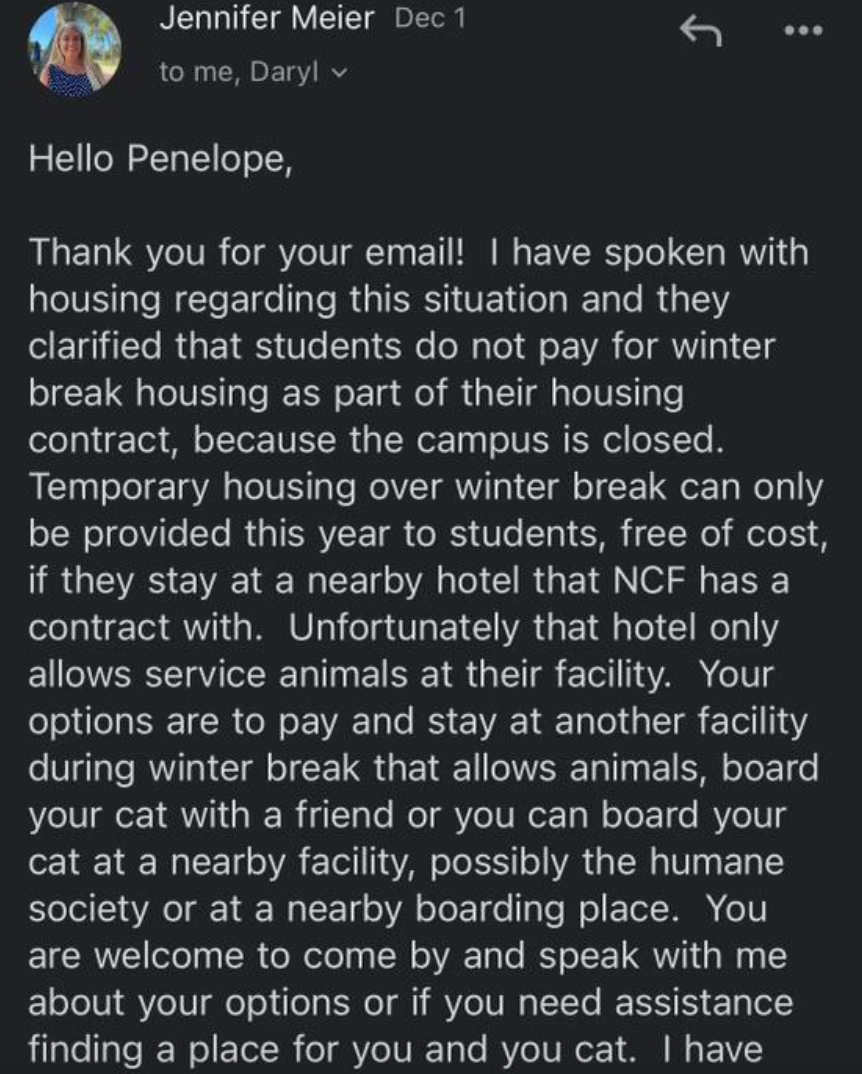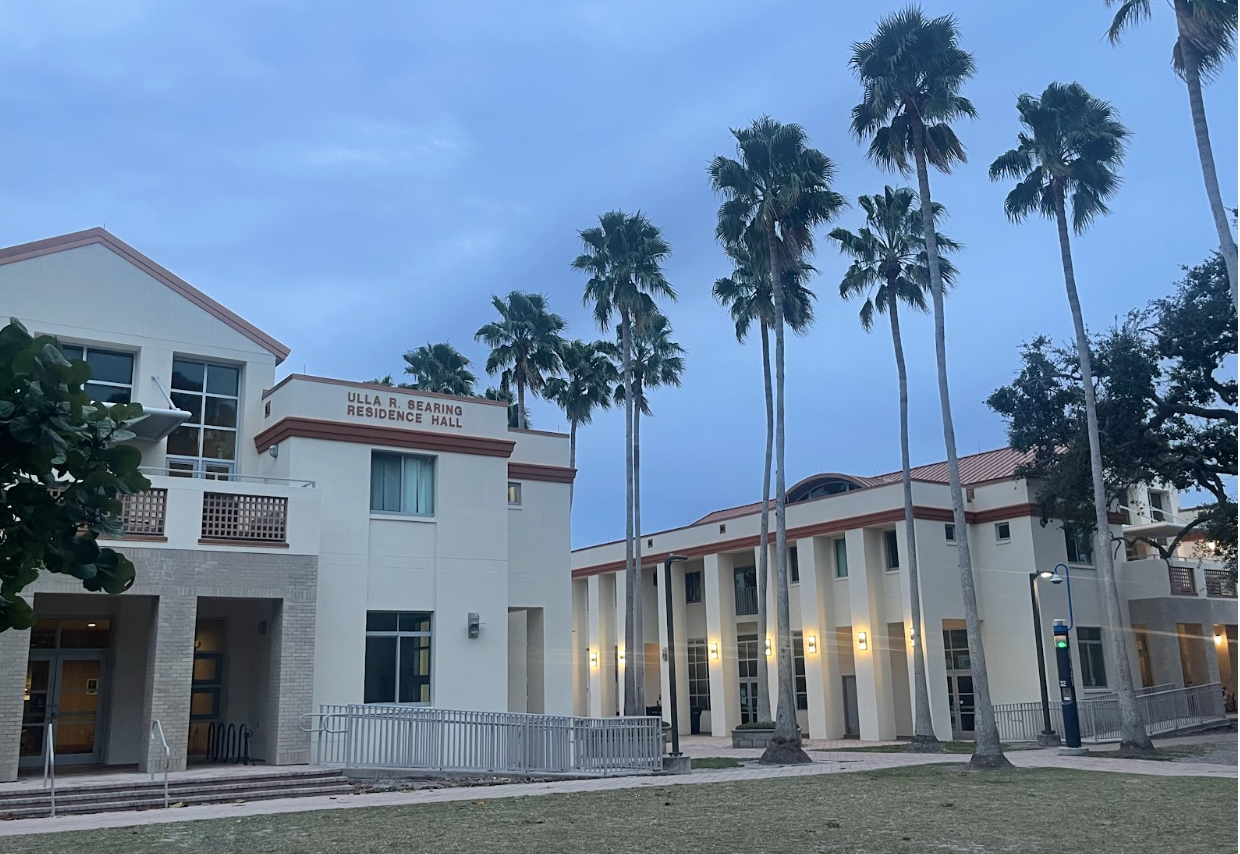In previous years, New College of Florida students had the option to reside on campus over winter break, despite the school being “closed” for the holidays from Dec. 16 to Jan. 1. But in a swift decision from the New College Department of Housing and Residence Life, students who registered for winter housing have found themselves being uprooted from campus accommodations and displaced. After being notified less than three weeks before they are expected to leave campus dorms, those who will be moving into hotels are still unsure of food availability and transportation, among other unanswered questions.
Students voiced frustration over getting no response after contacting Housing repeatedly to make sure their applications to stay on campus had been approved. Then on Nov. 27, they received an email stating that they would be staying in hotels instead. Third-years Penelope Donetti and Hannah Kleiman both said they were not given enough time.
“I wasn’t notified at all until I reached out to Housing myself,” Donetti told the Catalyst. “There was no disclosure of changes in the housing contract I signed, either.”
“I’ve only known for a couple weeks after emailing housing multiple times,” Kleiman explained in an email interview.
Donetti, who resides on campus with her Emotional Support Animal (ESA), felt that the school had not been transparent in their communication of hotel information.
“I wish the school would have let us know more in advance so I could have looked for a place for my cat with more time or an alternative option where I could stay with my ESA,” she said. “Two weeks isn’t enough time to find an affordable ticket to France.”
Donetti is an international student with no local housing options beyond her dorm on campus, where she lives with her ESA-designated cat, Peaches. She said she was notified by recently hired Associate Director of Housing Division of Student Affairs Daryl Bass that her ESA would not be able to stay at the hotel with her, as they only allow service animals. Donetti noted Peaches as being the reason she was able to get a dorm room on campus—as it is legally required under the Fair Housing Act to house her on campus with the ESA—instead of being put in a hotel like other students.
Donetti sent Bass an email on Nov. 30, with Consultant for Student Affairs Amelda Jacks copied, in which she questioned Bass regarding the college being required to house her with her ESA. Her email included additional questions about possible kitchen appliances at the hotel, whether transportation would be available for her, what the process to check in would be and if there were going to be any charges for the winter break housing. Bass responded by referring Donetti to Jennifer Meier, Director of the Accessibility Learning Center, and said Donetti would receive an additional email from him the following week with more details. Bass sent a stand-alone email on Dec. 12 with details on Donetti’s room number and the time frame during which she would be required to be out of her dorm, additionally informing her of the campus Food Pantry’s availability.

“I feel like winter housing has been something the school barely wants to talk about,” Kleiman told the Catalyst. “I didn’t know that they considered not offering winter housing until a friend told me. Even then, I didn’t know that I was going to have to move into a hotel until another friend told me and I got an email from Daryl Bass afterwards.”
Kleiman has to stay on campus year-round as she is legally homeless. She explained that she has nowhere else to go besides New College, so wherever housing places her, she has to move. Kleiman said she has reached out to Housing with a few questions and has received answers within a reasonable time frame, although she has received no information on whether she will be charged for the alternate housing location. Both students are also still unsure of what food resources will be offered by the school or hotel.
“[The change] is more negative for me because I’ll only have a mini fridge and a microwave, when in my dorm I was utilizing the stove,” said Kleiman, who lives in the Dort and Goldstein residence halls with a kitchen. Kleiman cooks her own meals in her room instead of eating at Hamilton “Ham” Cafe due to numerous food sensitivities.
“I also need to pack to live in a space I’ve never seen without much knowledge on the amount of room or storage I’ll have,” she continued. At the time of Kleiman’s interview on Dec. 11, she still did not know when she would have to move into the hotel or in what room she would be placed. She expressed that she doesn’t fully know what to expect, even when it comes to simple things like laundry.
“I’ve heard that some of the hotels don’t let the students staying there use their laundry rooms,” Kleiman said. “I find myself a little stressed out, because I feel like I do not know what is going on and I still haven’t been given more information.”
Bass told a Catalyst reporter that communal kitchens such as Z kitchen will be open to students and also the Food Pantry, which depends on outside donations for boxed or canned kitchen staples and occasional produce. But students are not allowed to leave food in shared kitchen fridges or it will be thrown out, as stated in an email sent out to the student body by Housing and Residential Life. Also, they cannot access their dorms during the break since the locks will be plugged, leaving those staying in hotels with the option to drive or shuttle over to campus with their ingredients and kitchen appliances.

Victor Cruz, General Manager of the Hyatt Place, didn’t seem entirely aware students would be staying at the hotel over New College’s winter break when he spoke with a Catalyst reporter. He initially thought he was being asked about students already residing in the Hyatt, not incoming ones.
“I’m quite sure the school will tell us who, and if that’s the case then that’s fine,” Cruz said. “We’re just helping the school so that’s no problem for us if the school says, ‘Hey these students are staying because they have nowhere else to go.’ We’re just following what they tell us.”
Cruz explained that the hotel is run the same way as the dorms. If students have a meal plan, then it’s a meal plan at the school, not at the hotel. He noted it would be no different when the campus is closed.
“That’s why they can’t eat breakfast here, because they have a meal plan,” he explained.
Cruz clarified that he didn’t want to sound harsh, he just has to follow the same rules as the college. He explained that student residents are allowed to order food from the menu since it’s self paid, and allowed access to the pool and gym. A mini fridge is also included in the rooms.
Cruz also offers students a breakfast buffet at a discounted rate on weekends. While non-guests can eat at the buffet for $25 a day, students can purchase a two-day breakfast voucher for $20.
It’s not clear how many students will be temporarily residing at the Hyatt. Bass reported that it amounted to fewer than 15, while Cruz said the list he received kept changing from how many were initially staying.
Housing Area Coordinator Lily Tanner told a Catalyst reporter that the decision to have students residing on campus stay in one of the hotels over winter break had been in discussion since the contracts with the hotels were solidified—a partnership that was announced in August. New College will not have to spend more to house students at the Hyatt over the break since the cost is already included in the original $7-million hotel housing spending.
According to Tanner, in previous years a member of Housing was always unable to leave campus during break since it’s not ideal to have students stay on campus without staff. This year from Dec. 22 to Jan. 2, the entire campus will be closed and no staff will be available on call or in their offices. The hotel however, will be fully staffed throughout the break, ensuring assistance in case of emergencies.
“Since we have hotels this year we’ve made the decision to have winter residents all stay at the Hyatt this year to enhance safety and minimize disruptions to residents and staff,” Tanner said.
Tanner additionally noted that from Dec. 18 to 22, facilities and contractors will be making repairs to rooms and checking air filters for some residence hall rooms. She said having students in the Hyatt will prevent disruptions to students by repair and facilities crews.
“There wasn’t much opportunity to discuss why I couldn’t stay on campus in my dorm with my ESA, a full size fridge and access to the community kitchens like previous years,” Donetti said. “When I asked, I was repeatedly told by Daryl that it was because ‘they’re going in a new direction now.’
“I’m very disappointed in the way this was handled, I felt that the school provided no help to accommodate me with my ESA. I’m considering looking at housing off-campus next year since that seems to be a more stable option.”
Housing is still unsure if hotel relocations over winter break will continue in future years or not.

